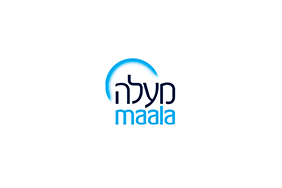Israeli Innovation for Good Life: What's Happening at Tel Aviv's International Conference
Published 12-19-17
Submitted by Maala - Business for Social Responsibility
 Above: Photo by Sharon Amit Below: Photo by Yoav Zohar - Click to watch video
Above: Photo by Sharon Amit Below: Photo by Yoav Zohar - Click to watch videoRecycled shampoo bottles and two new CSR bond-indexes were launched at the second annual Maala International Conference, which was held on 29-30 November by Maala – Israel's Corporate Social Responsibility (CSR) organization, with the theme of innovation for good life.
The next steps in sustainability via innovation were presented by global corporations such as Microsoft and P&G, as well as leading Israeli companies like Strauss, Teva, Bank Hapoalim and Shikun & Binui. Innovative products that support meaningful relationships; solutions for smarter sustainable cities; and food-tech to improve people's nourishment. "What was really impressive was to actually see how in banking, hi-tech, pharma, utilities and construction – sustainability is authentically imbedded in R&D work, in a way that makes one optimistic on how Israel can contribute to the SDGs" said Maala CEO, Momo Mahadav.
Standing out in the connection between sustainability and innovation was Virginie Helias, VP Global Sustainability at P&G, who presented the first ever recycled plastic shampoo bottle, comprised of 10% plastic washed up on shores and 90% plastic recycled by consumers. The participants were handed samples of the shampoo bottles, which will be available in Israel in April 2018.
The conference featured roundtable discussions with international ESG investors, analysts and raters, alongside top Israeli companies with the topic of how can Israeli market leaders attract sustainable investors. The session was moderated by Yael Almog, who heads a unique new C-suite position at Bank Hapoalim of engagement and stakeholder dialogue. As part of the discussion, Sasja Beslik, Head of Group Sustainable Finance at Nordea Bank, emphasized his commitment to fully explore on the ground the positive impact on local communities that each investment could bring. This was echoed by Ulrika Hasselgren, Global Head of Responsible Investment Strategy and ESG Integration at ISS, who reminded the importance of putting local stories into an outsiders perspective and warned investors from the hazard of the stories being lost in translation.
This session coincided with the launching of two new ESG bond indexes on the Tel Aviv Stock Exchange (TASE). As the CEO of the TASE, Ittai Ben Zeev, explained, "Given the high performance of the existing Maala index, we found it fit to expand the family with new CSR indexes, thus creating a new platform for international investors to invest in the Israeli market".
Participants from more than 120 businesses, 80 organizations and government agencies were among the 800 attendees of the two-day Conference. Among others, the conference showcased a unique side event where, Bank Leumi, one of Israel's largest banks, acknowledged a number of its suppliers that entered the Maala mid-size CSR index, thus expressing that the company will reward its suppliers who are committed to CSR. Maala pointed out that this is a way to expand CSR work to the tier of small and mid-size companies.
During the conference's second day, participants had the opportunity to explore some of the innovative CSR practices executed by Israeli companies in a range of field tours throughout the country. As one of the participants expressed, "it was mesmerizing to feel the sustainability work on site. As was shown on my tour, Shikun&Binui's innovation lab, 'Buildup', exemplifies how companies and startups from all sectors join forces to innovate and create our future cities". Building on their success, the tours will also be featured in the 2018 conference.
In addition, there were numerous other companies and organizations involved in the conference, such as Noble Energy, ICL, Israel Discount Bank, El Al, Unilever, Adama, G1, Netafim, Intel, Thinkstep, Goodvision, BDO, The Israeli Forum for Diversity, JDC Israel Tevet and The Association of Oil and Gas Exploration Industries in Israel.
Look out for more stories on Israeli innovation in the next few months, and stay tuned for the Maala 2018 conference.

Maala - Business for Social Responsibility
Maala - Business for Social Responsibility
Maala is a non-profit corporate membership organization promoting ESG and corporate social responsibility (CSR) in Israel. Founded in 1998, Maala is considered as the ESG standards-setting organization in Israel. Presently, the membership organization is comprised of some 130 members, Israel’s largest companies.
Maala publishes the Maala ESG indexes annually on the Tel Aviv Stock Exchange, and as of 2016 organizes an annual international conference in Tel Aviv.
Our Mission
Helping companies increase their social and environmental impact
- Sharing practices & mutual learning
- Flagging priorities & developing joint initiatives
- Setting voluntary standards for business in Israel
Driving Change through
- A network of 120 member companies, Israeli and global companies operating in Israel 2. A hub for sustainable business practices, solutions and cross-sector collaboration.
- An annual CSR index rating 153 companies, also traded on the Tel Aviv Stock Exchange.
Maala ESG Index Facts & Figures
- Over 150 companies rated. (vs. 47 when the index was launched in 2006)
- Approx. half are of Israel’s large companies, rated on the Maala Advanced Index
- Approx. half are of Israel’s mid-size companies, rated on the Maala Basic Index - Aggregate revenue: $137 billion; over 350,000 employees
- TA Maala Index includes half of the total market value traded on the TASE.
Maala ESG Index Main Features
- National based index – a prestigious Israeli business club
- Local adaptation of global ESG and sustainability standards
- A guidebook for local expectations and priorities
- Reflects local market business culture

